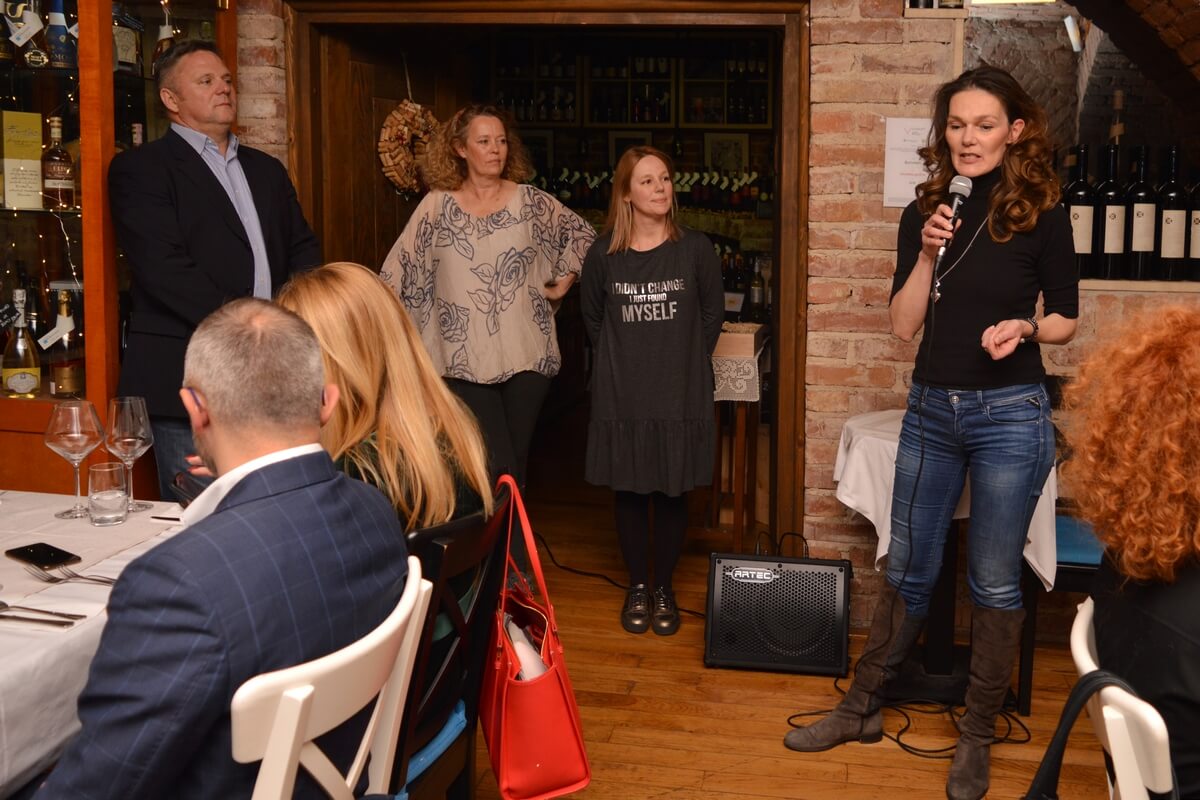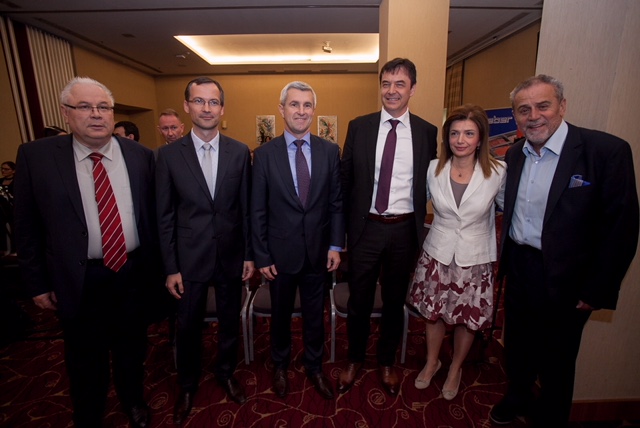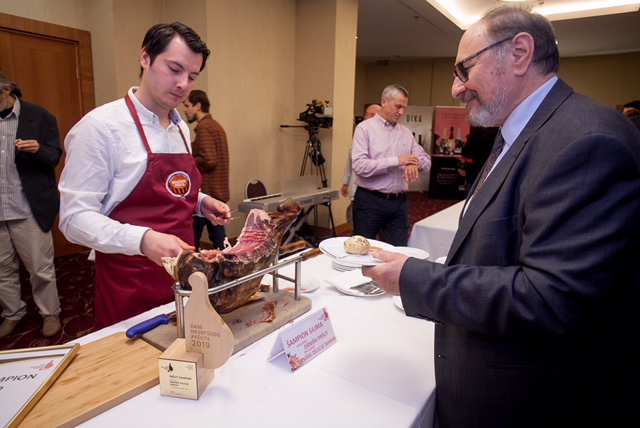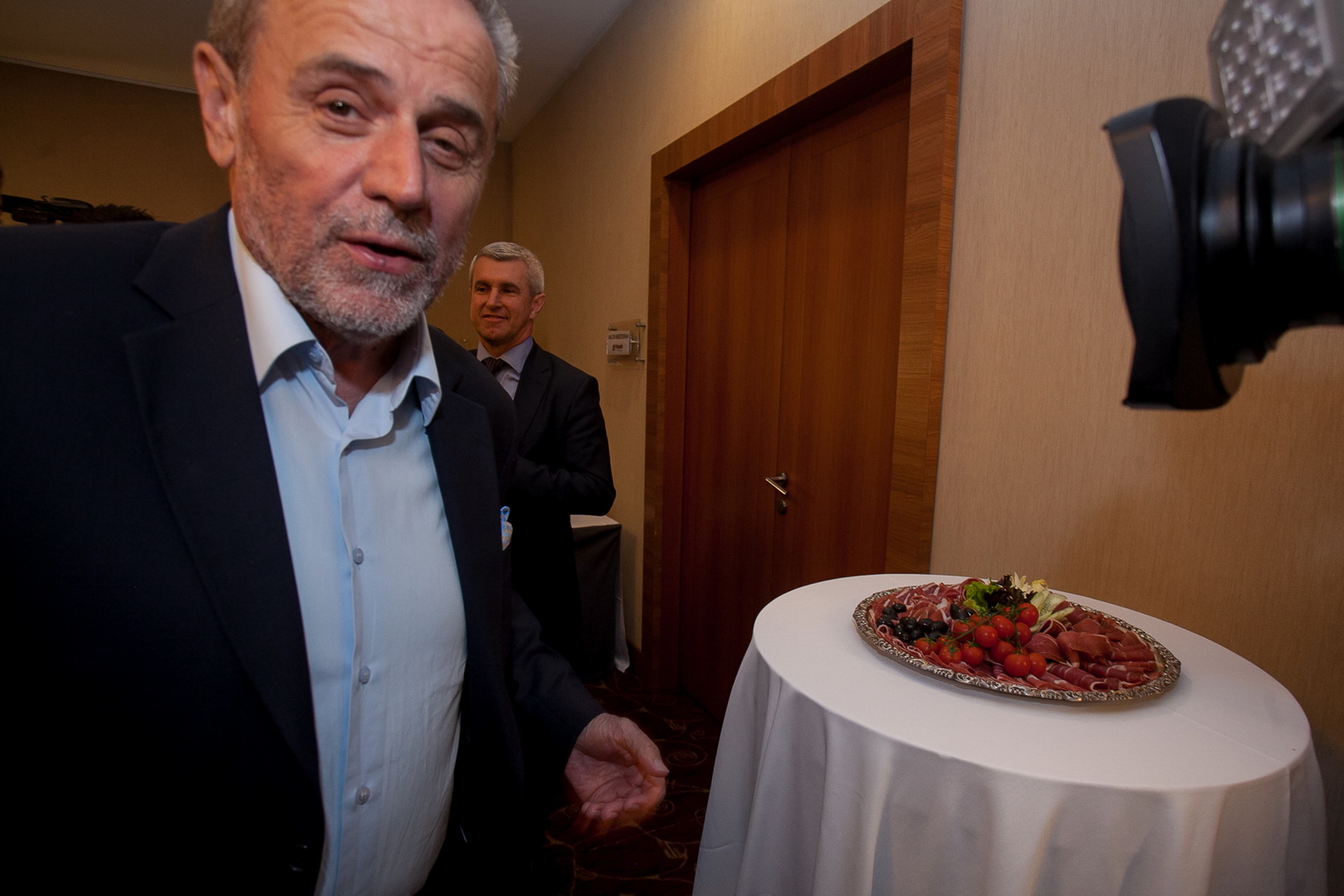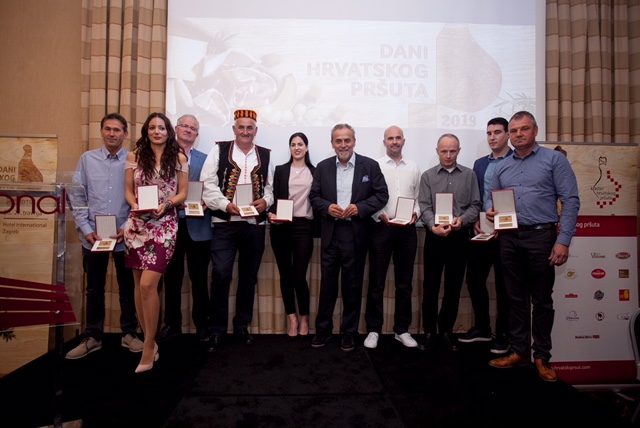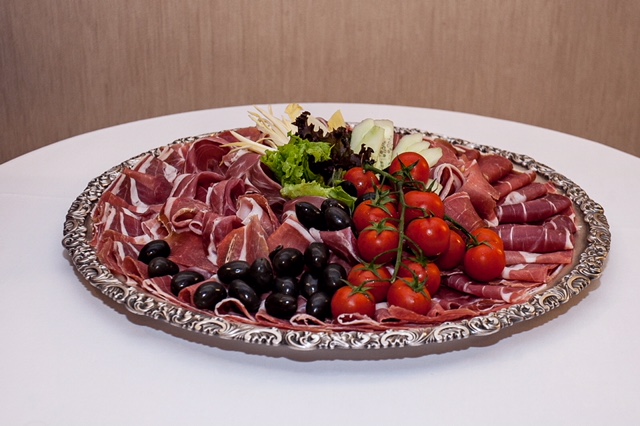We Love Local – Platform Promoting Locally-Grown Ingredients
All of us have been overwhelmed with industrially-produced food, with few nutrients and often contaminated with pesticides and herbicides. A new platform focused on good, high-quality, healthy local food – called We Love Local – was presented on Tuesday at the renowned restaurant Rougemarin City in Zagreb, headed by chef Marin Medak.
It puts the focus back on local food and seasonal ingredients, and it was a real opportunity for good food fans, journalists, food experts, food bloggers and many celebrities, i.e. all those who want to return to healthy and homemade food and ingredients, to meet at one of the most beautiful terraces in the town.
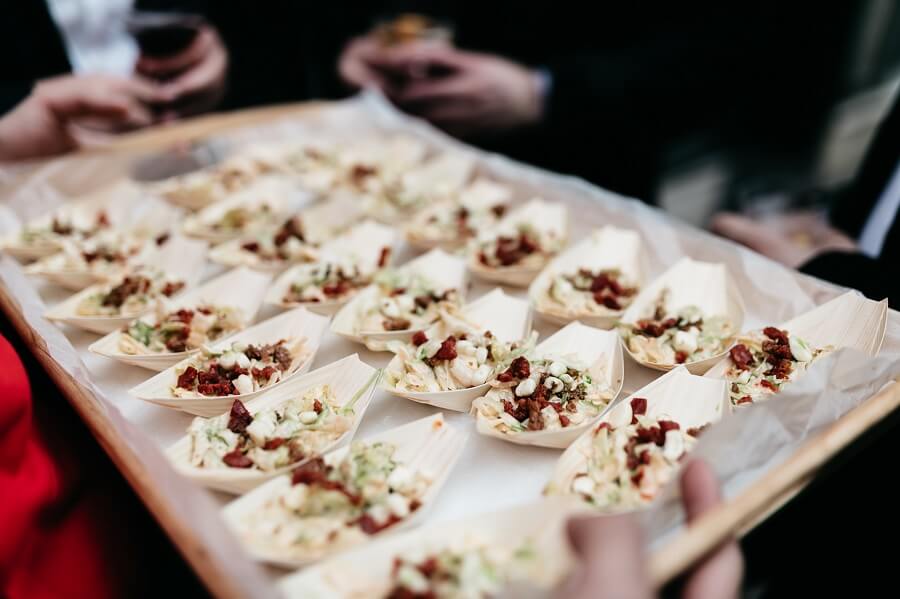
Chef Marin Medak presented the project in the best possible way: he prepared imaginative and unexpected, and yet authentic delicacies made from fresh and high-quality local ingredients, and demonstrated how the platform should operate – by connecting small local farmers and food producers with restaurants serving the best dishes prepared from such local ingredients.
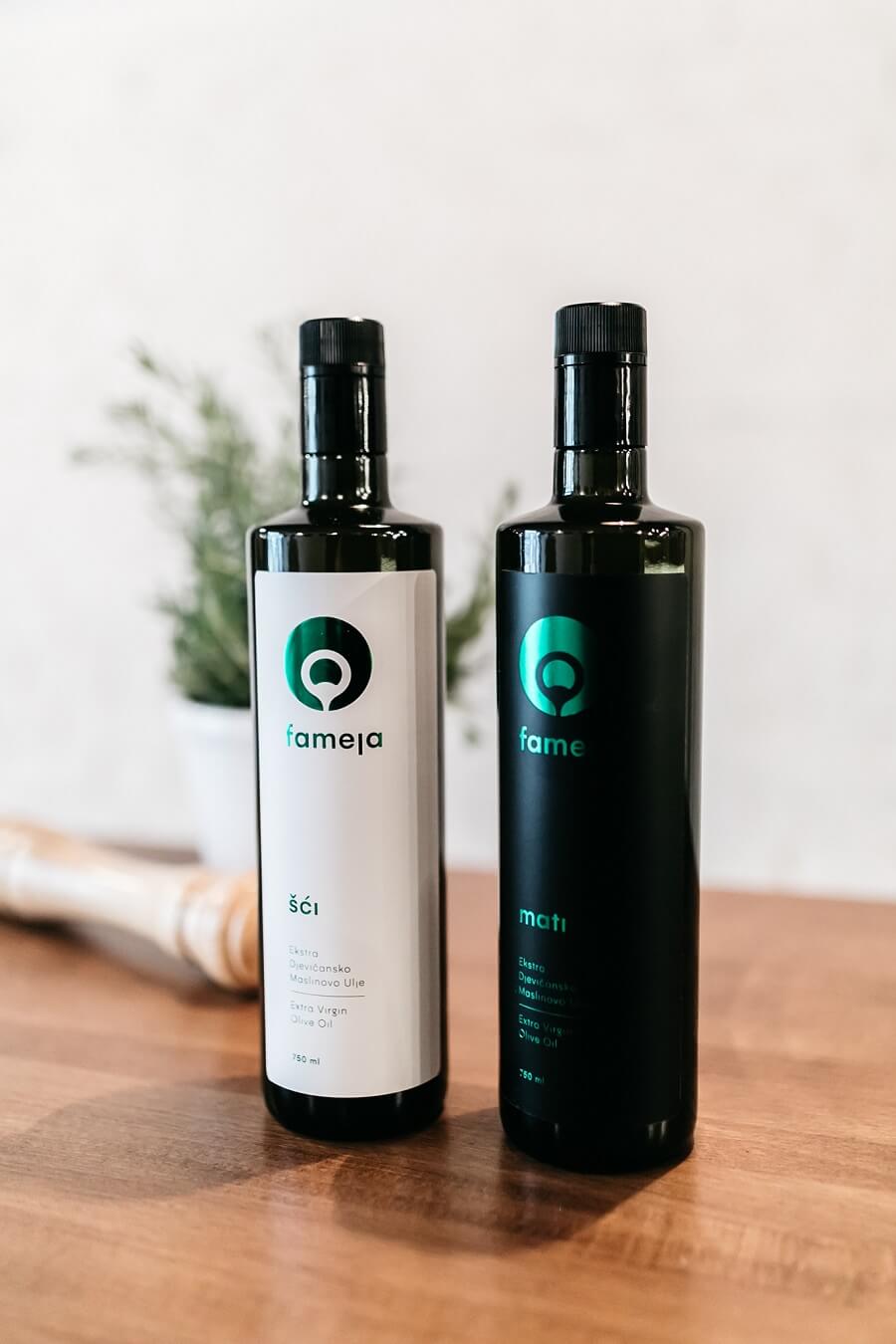
Among ingredients which found their place in the kitchen and on the table were the juicy tomatoes Rajska, which smell of a carefree summer; fragrant Istrian olive oils by the boutique brand Fameja; exquisite wines of the esteemed winemaking family Pilato from Istria, who recently won a gold for their 2015 Malvasia Sur Lie at the Decanter in London; then the Mendek Selekcija wines; Istrian craft gin and fruit liqueurs produced by Aura distillery; the GUUC natural juices and quality beer by the Hajsonberg brewery.
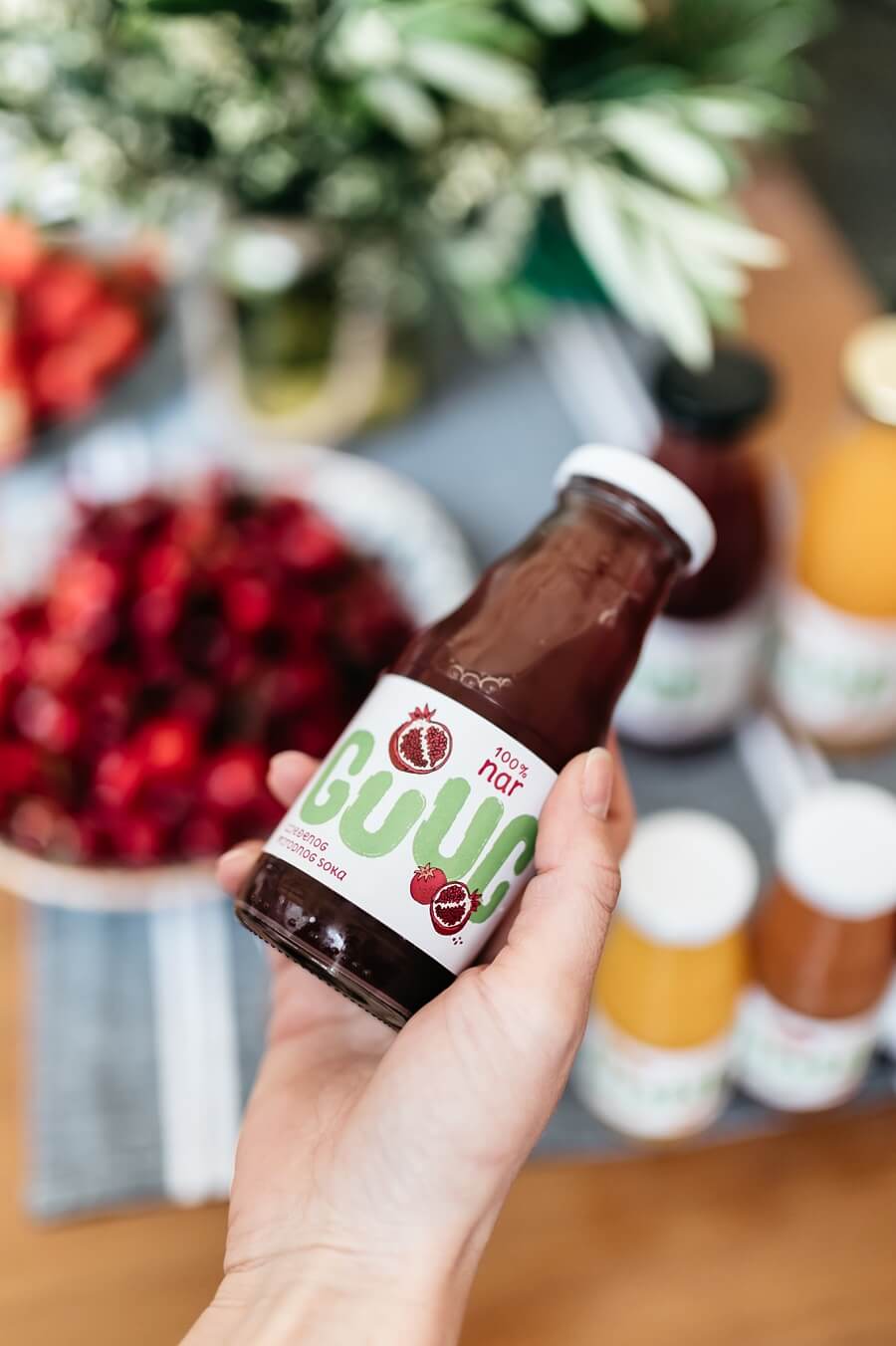
We Love Local should be a sort of a national treasury of outstanding food products and ingredients. With the vital support of two top chefs and gastronomic visionaries, Marin Medak, owner of the legendary Rougemarin, and Rudolf Štefan, owner of the Pelegrini restaurant and the host of Chefs’ Stage, the project was launched by the Alert marketing agency and the Journal.hr lifestyle website. The Croatian company Nord Produkt proudly supports the project.
The common goal is to support, grow, strengthen and economically empower small producers of autochthonous products and to recognize and promote the excellence of Croatian cuisine. Chef Marin Medak, the passionate advocate of the project who has followed this approach for years, has succeeded in bringing his love of authentic homemade foods made from local high-quality and fresh ingredients to guests through courses of original dishes.
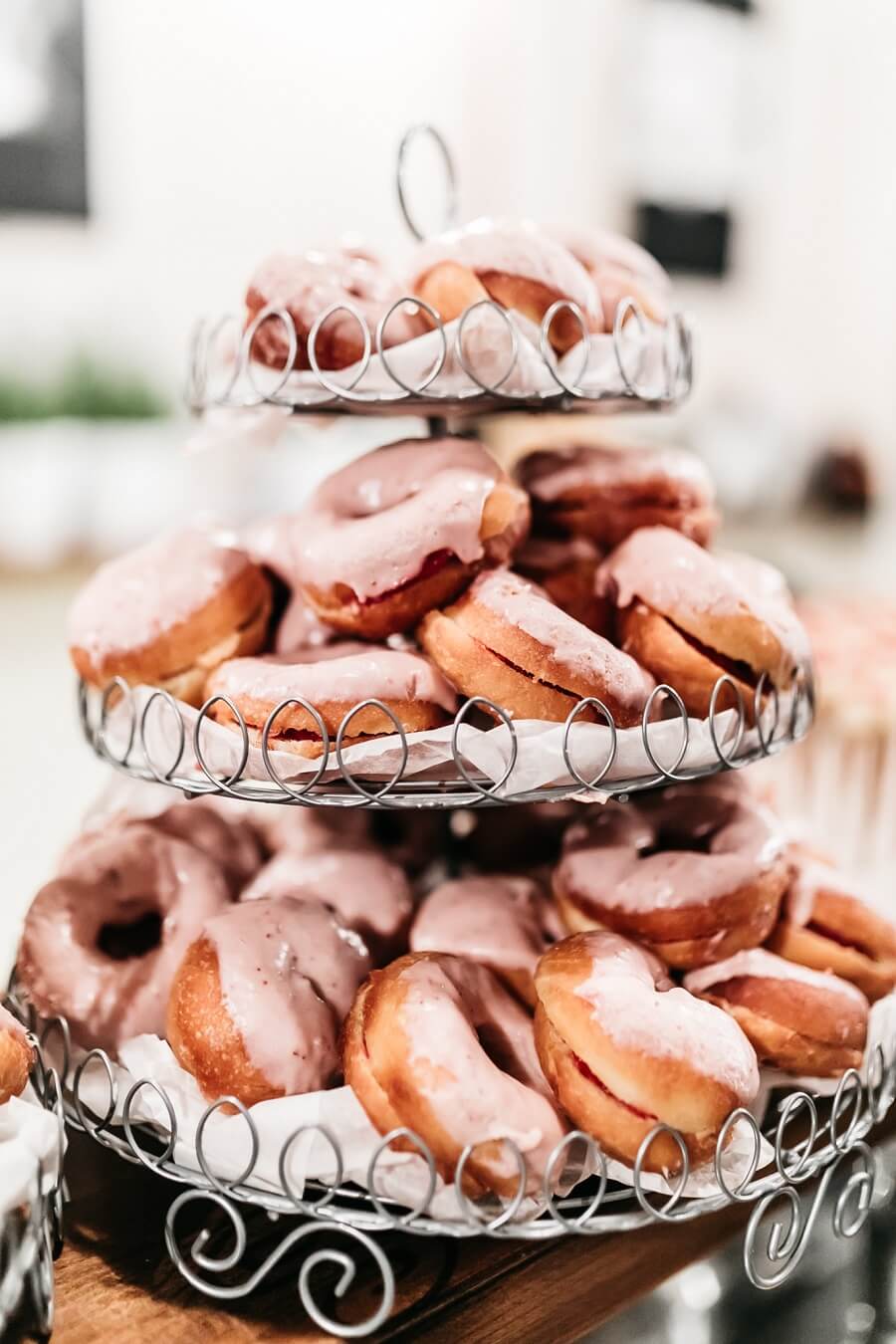
He said, “I believe in the We Love Local concept of quality food from the farm to the table. This is why these newly-presented dishes will find their place on the new menu of Rougemarin City. We will serve autochthonous Croatian cuisine made from delicious local ingredients and in a street food fashion. This is a brave change in the approach, but the advocate of a project has to lead by his example. I expect that we will start a trend that will be helpful for small producers, restaurant guests and the society as a whole.”
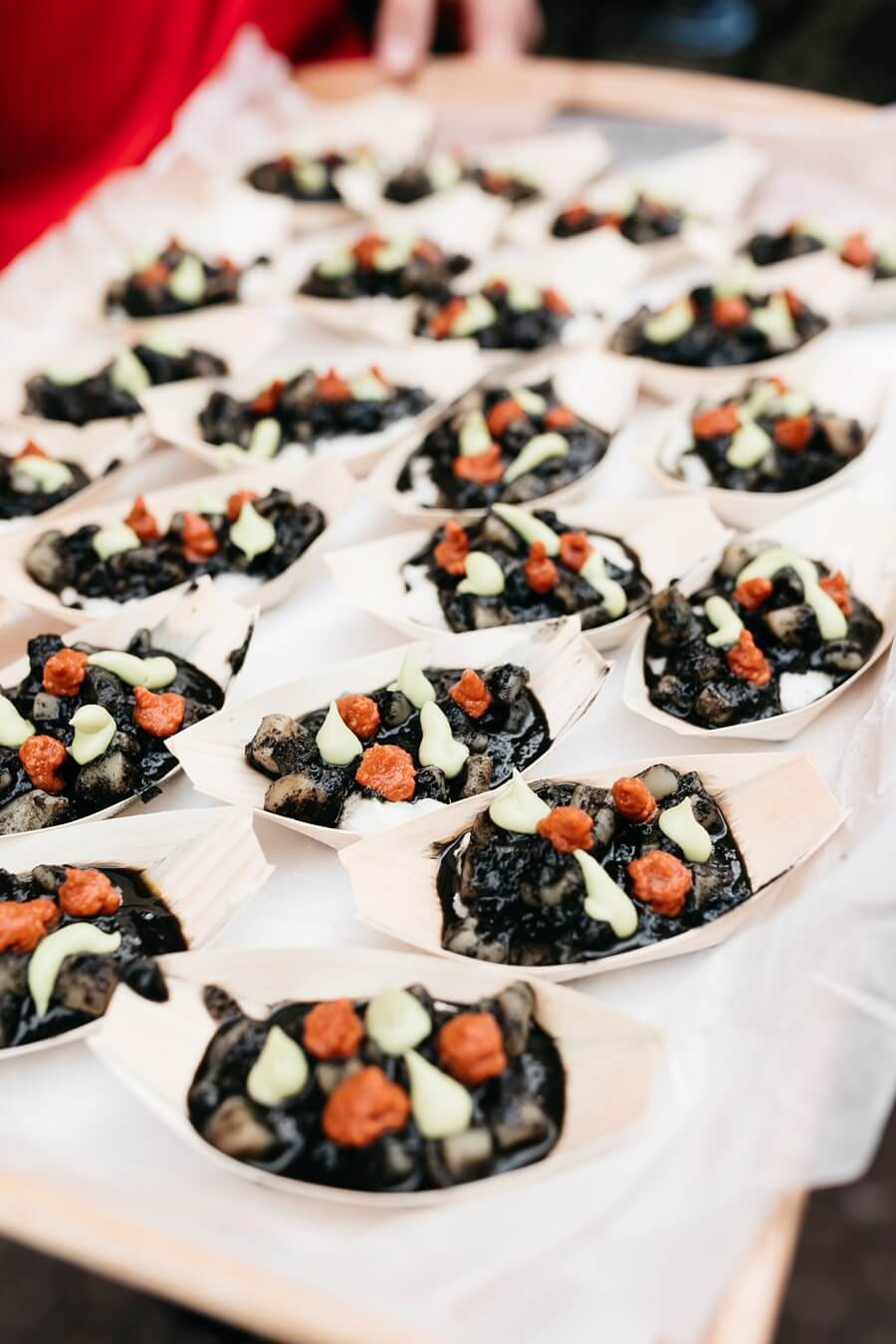
In order for all the restaurants that support, buy and serve food made from locally-grown ingredients to be recognizable to guests who want to eat better, the We Love Local platform has prepared unique labels that will make it clear to guests where they can find nutritionally rich, fresh and tasty locally-grown food.
Iva Radić, the founder of the influential website Journal.hr and one of the project’s initiators, said, “I love this project! We are making local food fashionable again, and we celebrate the beauty of simplicity while building a better future and giving our people a reason to stay in the country. We are launching good and important things. This is something our children will talk about to their kids.”
We Love Local campaign can be followed on social networks Facebook and Instagram.
More news about food can be found in the Lifestyle section.
Cheese and Wine Festival Held in Valpovo
On Saturday, May 11, the second cheese and wine festival took place in Valpovo. The festival venue, as last year, was Valpovo’s medieval-baroque complex of the Prandau-Normann castle. There are a number of events dedicated to wine being held, but this event is unique because it puts the emphasis on both the wine and the cheese, as well as on how to pair the two. Some of the best wine and cheese producers from Slavonia, Baranja and Srijem took part.
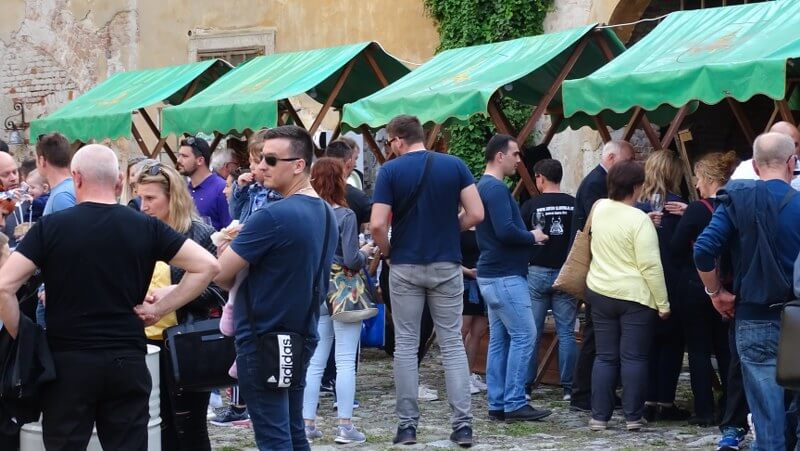
With the exception of the Podolski winery from Križevci, all the other wineries were from the Danube region, and it can be said that the Danube is the link which connects them all. Although it is not perceived as such by the public, Valpovo could be said to be located in the Danube region. Namely, the only suburb of Valpovo situated on the Drava river is located 42 kilometres from the point when the Drava meets the Danube River.
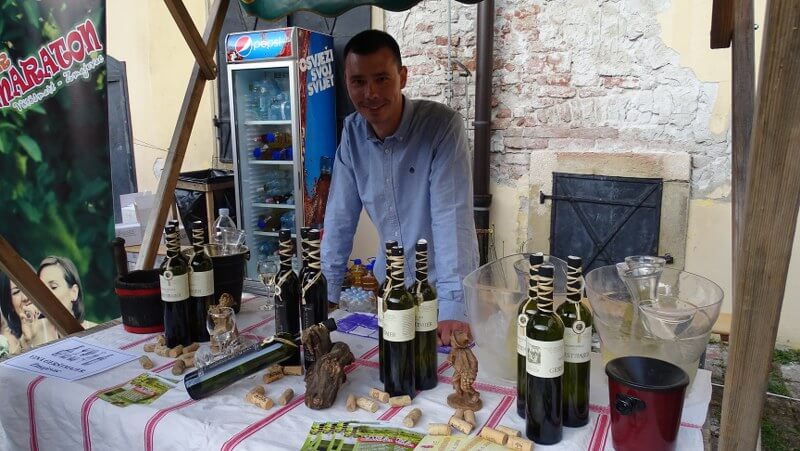
The Baranja wine area was presented by wineries Gerštmajer, Josić, Kolar, Kalazić, Svijetli Dvori, Szabo and Zajec. The Gerštmajer winery was represented by Ivan Gerštamjer Zelember, the fifth generation of the Gerštmajer wine dynasty from Baranja. Their wines are already well-known to everyone; for most connoisseurs, they represent the essence of traditional, original Baranja wine-making.
The other winemakers from the Baranja area were represented by the head of the Baranya Julia wine shop from Zmajevac, Gabriella Gerštmajer, who is also the vice-president of the Surduk association, organiser of legendary events in Zmajevac such as the Wine Marathon.
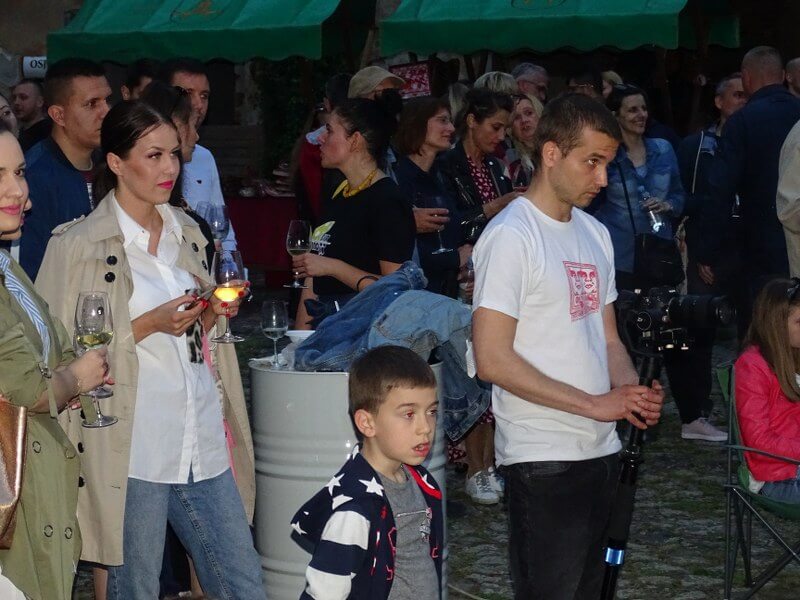
The Josić winery also comes from the Baranja wine capital Zmajevac. In addition to their wines, also highly acclaimed is the Josić winery’s restaurant, where their wines are served and paired with Baranja delicacies. Recently they decided to rebrand the visual identity of their wines, but the quality has remained at an exceptional level.
The Kolar winery comes from Suza, a town connected to Zmajevac and through which you must pass if you are coming to the wine capital from the direction of Kneževi Vinogradi. The Kalazić winery is on the road that runs from Zmajevac to Batina. Svijetli Dvori and Szabo wineries can be found in the Karanac ethno-village. All Baranja wineries presented at the festival came from the Kneževi Vinogradi municipality, which is just one of nine local self-government units in Baranja.
The Erdut wine area is located to the southeast of Baranja. This area geographically belongs to Slavonia, and it was represented by wineries Danubio, Iuris, Magistra and Siber. The Ilok wine area was represented by the Buhač, Papak and TRS wineries.
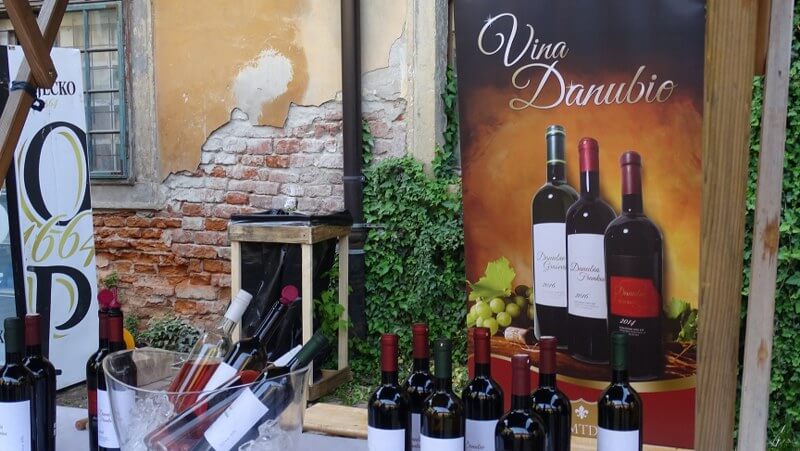
The cheese producers who came to the festival were family farms Geto from Lug, Glavaš from Bizovac, Gašić from Beketinci, Đurković from Marjančaci, Lehki from Gat, Pranjić from Drenovci and Mala Mljekara from Valpovo.
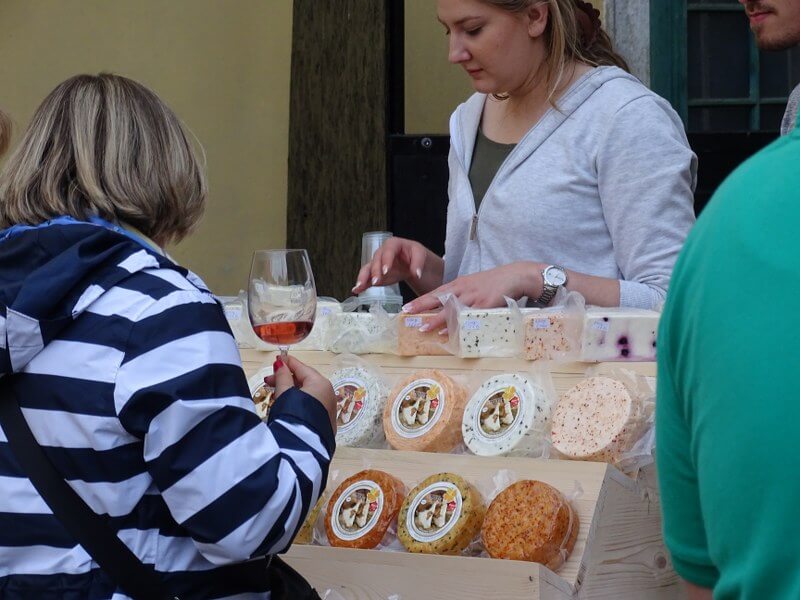
The Golubov family farm from Draž presented its elderberry juice, while family farms Brkić and Kraljik showed their cured meat products. The Horvat family farm from Duboševica prepared homemade pasta with poppy seeds and walnuts.
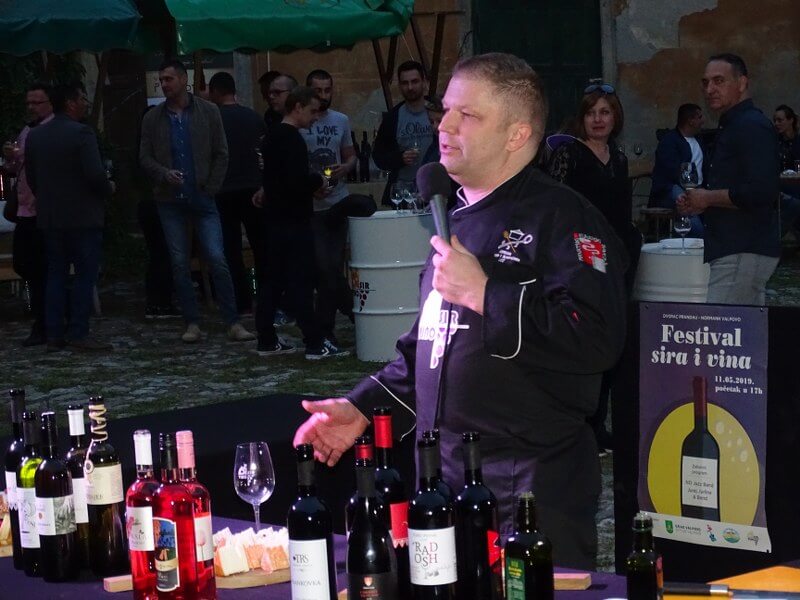
The highlight of the festival was the pairing of cheeses and wines, led by Tomica Đukić, the chef of the Osijek Hotel restaurant and the chief cook of the Croatian national football team.
More wine news can be found in the Lifestyle section.
Fajferica Gastro Show Held in Drenovci
After the Black Pig Restaurant in Čepin, this animal species now also has its festival! On May 10, Drenovci hosted the first Fajferica Gastro Show. Fajferica is the black Slavonian pig, the autochthonous pig created by crossbreeding the sows of the Swallow Belly Mangulica breed and boars of the Berkshire breed. Then the best sows were crossbred with boars of the Poland China pig. The breed was created in the second half of the 19th century at the Orlovnjak wasteland near Tenja, not far from Osijek, and was named after the owner of the estate, Count Dragutin Karlo Leopold Pfeifer.

The village of Drenovci is situated on the extreme south-eastern edge of Slavonia, also known as Cvelferija. Some would say that Cvelferija is located on the southwestern corner of Srijem and they would also not be mistaken. The boundary between Slavonia in the west and Srijem in the east is fluid, not strictly defined, and besides, the former Srijem County with its seat in Vukovar was an integral part of the old Slavonian kingdom, a subregion of Slavonia, so it is not wrong to say that Drenovci, as well as the whole of Cvelferija, is located in both Srijem and Slavonia. The name of this micro-region originates from the times of the Military Border (Latin: Confinium, German: the Militärgrenze) when the Sava River was a natural border that separated the Habsburg Monarchy from the Ottoman Empire.
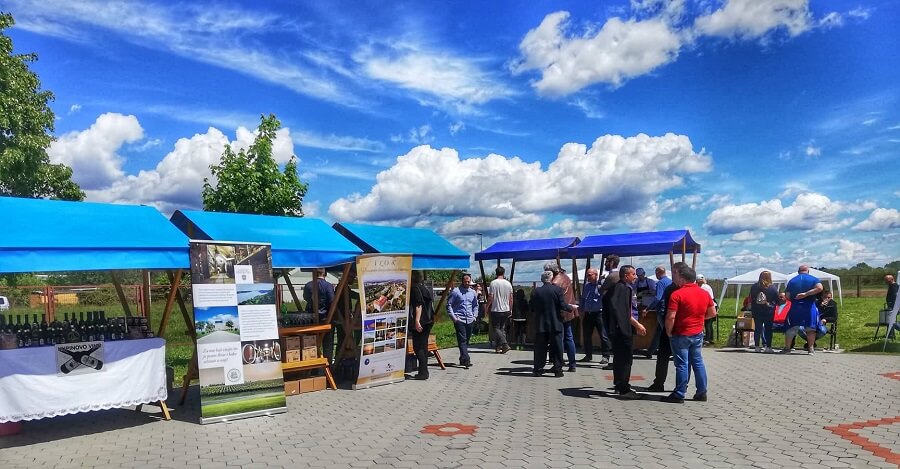
At its peak, the Military Border stretched 1,850 kilometres in length, from the Adriatic Sea to the province of Erdelj in present-day Romania, consisting of seventeen regiments, of which three regiments (the seventh, eighth and ninth) represented the Slavonian military frontier. The regiments were divided into companies, and the area of today’s Cvelferija comprised the 12th company of the Brod regiment. In addition to Drenovci, Cvelferija includes the villages of Vrbanja, Soljani, Strošinci, Đurići, Račinovci, Gunja, Rajevo Selo and Posavski Podgajci. The last time this area was in the media focus was during catastrophic floods five years ago. Fortunately, many positive things are happening in this area, including the Fajferica Gastro Show.
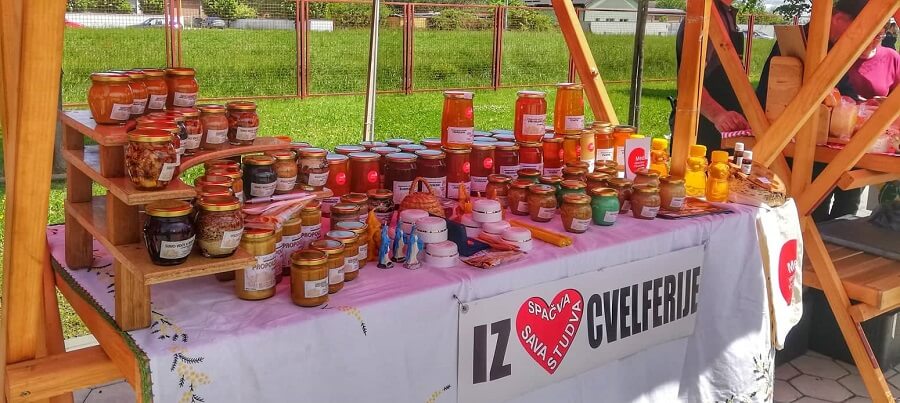
The event took place at the Agricultural Entrepreneurial Incubator in Drenovci. It started at about 10 am with a small-scale fair of autochthonous products. Specialities made from black Slavonian pigs were paired with red wines of Iločki Podrumi and the dark beers of the Valens craft brewery from Vinkovci.
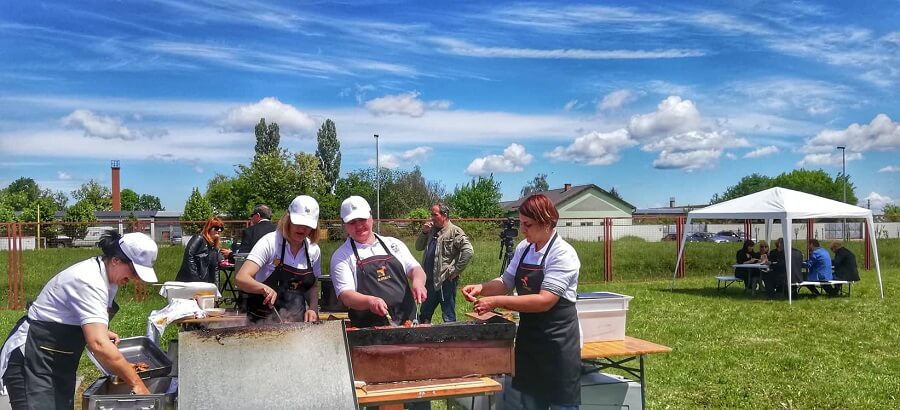
Chef Tomislav Špiček prepared treats for all the visitors. There is no need to spend too much time introducing him since he is well-known from various culinary programmes broadcast on national television stations.
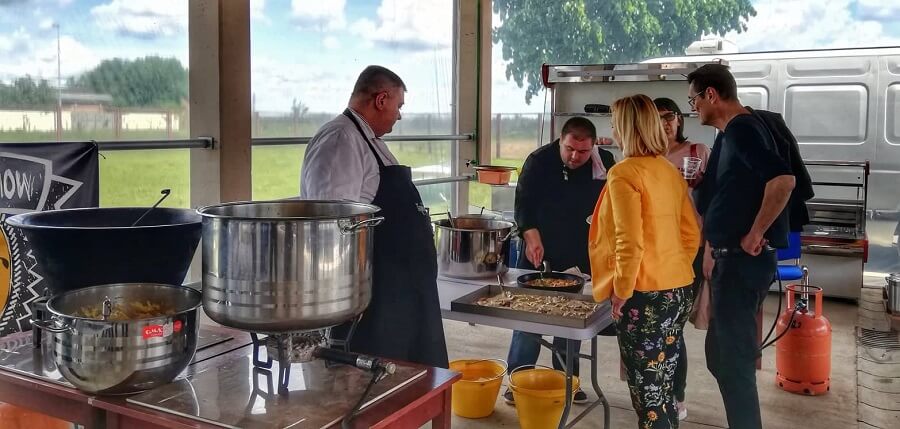
Dark chocolate with pieces of Kulen was presented by Margareta Vučak, owner of the Veseli Vagon chocolate shop, whose motto is “fresh & furious”. The festival also included numerous lectures, with interesting topics such as “Why do we love pork?” and “Are fats being unfairly excluded from the menu?”
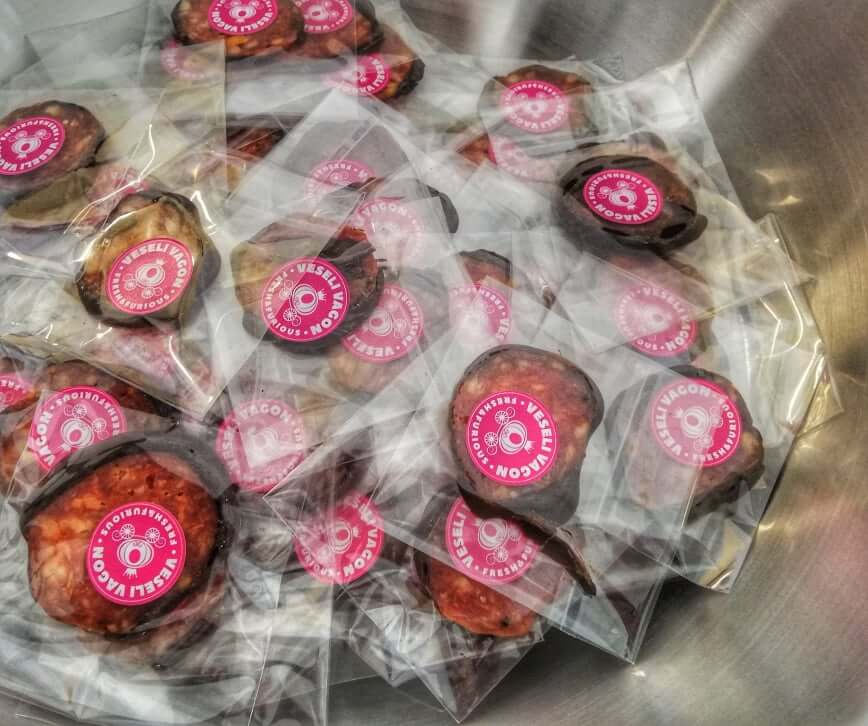
Fajferica Gastro Show also included a sales section, with black Slavonian pigs being on offer. I saw personally that a dozen of them were sold to the Karlovac area, indicating there is interest for the Fajferica pigs even beyond the borders of Slavonia and Baranja.
Cured meat products made from black Slavonian pigs, delicacies prepared by celebrated chefs, crafts beers and brilliant Srijem wines, unusual combinations of Kulen and chocolate, all this is the reason why the first Fajeferica Gastro Show fully met the expectations. I hope that the event will become a traditional one and that the next year it will make an additional step forward.
More Slavonia news can be found in the Lifestyle section.
Australia Meets Croatia at Bornstein Wine Bar
On Wednesday, May 8, the legendary Bornstein wine shop and wine bar at the Kaptol in Zagreb was the venue for a special “meeting” between Croatia and Australia at a gala dinner “Australia meets Croatia”, a part of the G’Day in May project – the typical Australian abbreviation for “hello” or “good day”. The dinner and wine pairing at Bornstein was organised together by the Embassy of Australia, the Bornstein wine shop and wine bar, and the dynamic Women On Wine association from Croatia. The name of the project illustrated the fact that the evening would be relaxed and not very formal, regardless of the fact it was attended by H.E. Elisabeth Petrovich, the ambassador of Australia.
Australian wines were paired with Croatian food and vice versa, and the evening began and ended with exceptional wines from one of Australia’s oldest wineries, D’Arenberg (1912), from the world-renowned and well-known wine region of McLaren Vale from the very south of the Australian continent. It is a Mediterranean-like climate area, so the wines are expressive, with pronounced aromas, and the winery is renowned, in addition to its excellent wines, for the unusual names it gives to its wine labels.
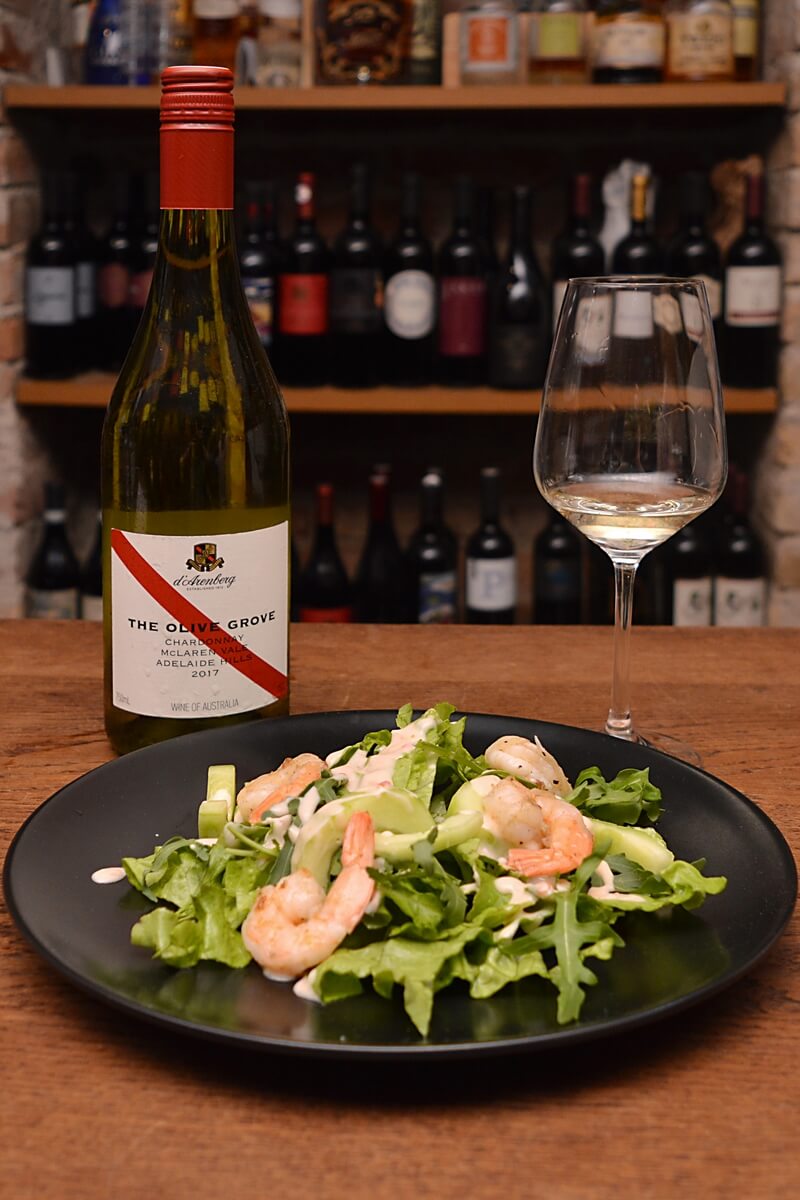
The first wine, The Olive Grove Chardonnay 2017, is a wine of dramatic fruitiness (peach, melon, quince), creaminess and, unusually for Chardonnay, spicy aroma in the aftertaste. It was nicely paired with the grilled mini shrimps on cutting lettuce prepared by Bornstein. About 50 guests returned to the Mediterranean, but the real Croatian one this time, thanks to Jo Ahearne, a London-born who began building her wine career in Australia and several years ago moved to Hvar to become a wine producer there. Jo Ahearne is the only woman in Croatia holding the Master of Wine title, and there are fewer than 150 such masters in the world.
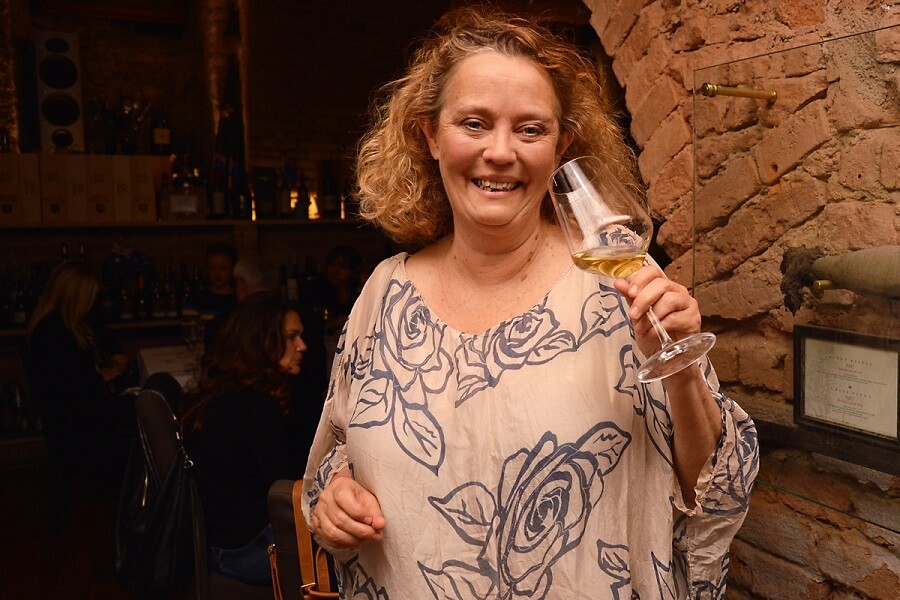
Ahearne presented two of her wines – Wild Skins and Plavac Mali. Wild Skins is a blend of three autochthonous Dalmatian white varieties – Bogdanuša, Kuč and Pošip – a great wine whose structure is similar to the structure of macerated white wines with quince aromas and the notes of honey and spice herbs. The rabbit ragu with gnocchi was an excellent pairing for this wine, created by the FinoVino restaurant culinary team.
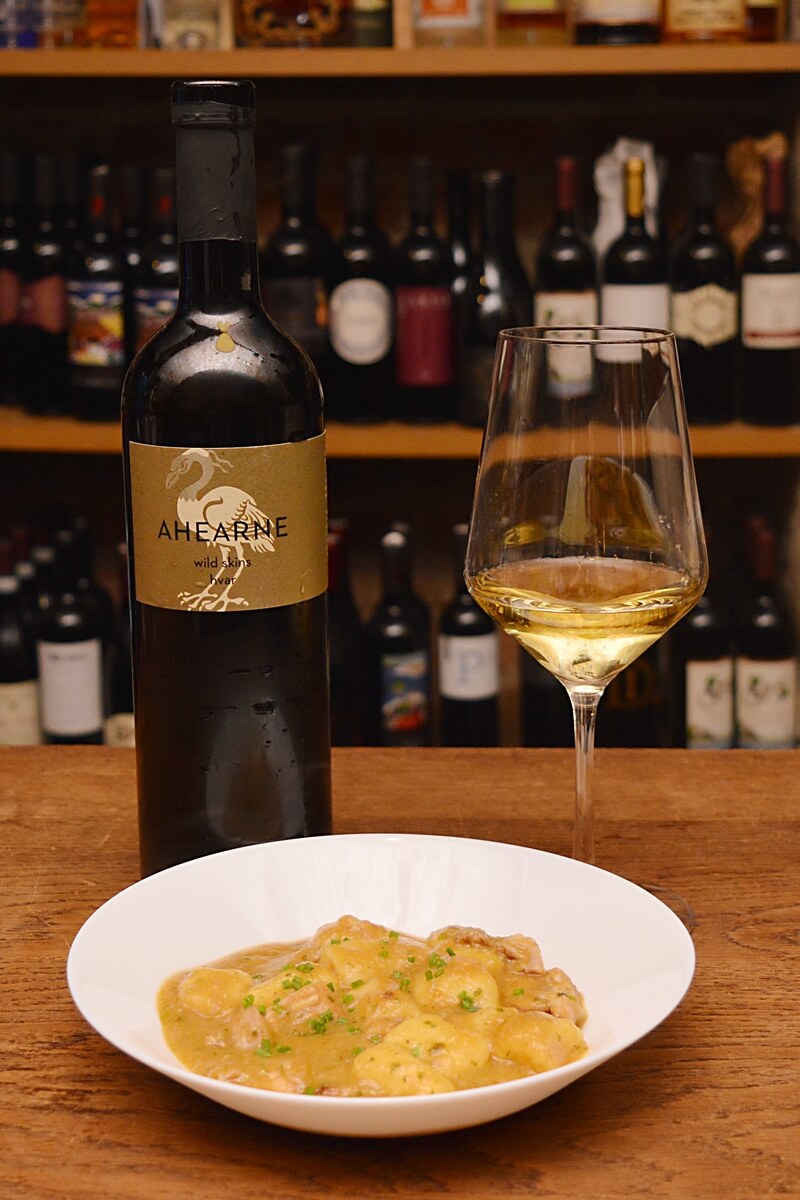
The 2014 Plavac Mali presented Dalmatia in a slightly different light. By ageing in oak barrels from Burgundy in France, the wine demonstrated the freshness and lively fruitiness of ripe plums, with pronounced herbal notes and traces of dark chocolate. Lamb chopsticks and browned polenta from the Fino Vino restaurant received the compliments from the audience, and together with Plavac Mali, they were the best pairing of the evening.
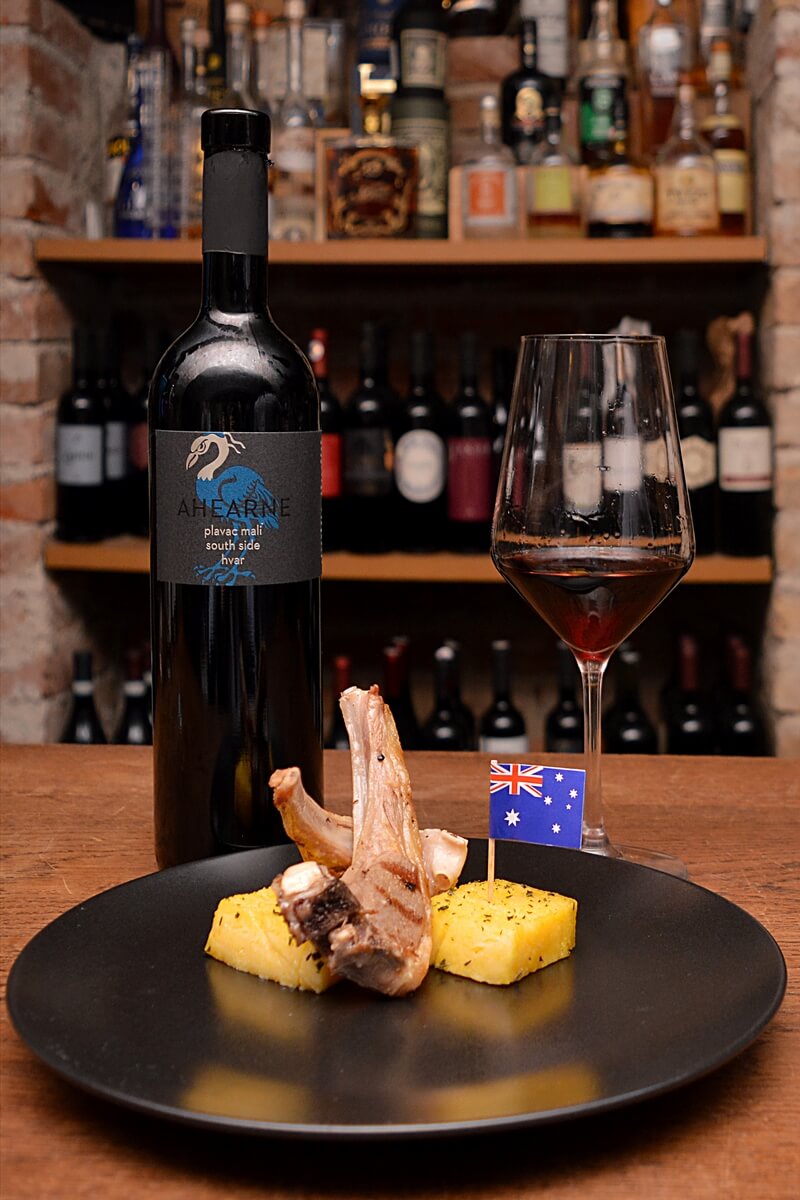
The event ended with The Footbolt Shiraz 2016, a typical representative of the Australian Shiraz. Plum and blackberry fruits could be felt in it, with a spicy aroma at the end, paired with the “icing on the cake” – a dessert in the form of a roll called the Pavlova (cake), made by the Australian Embassy’s chef.
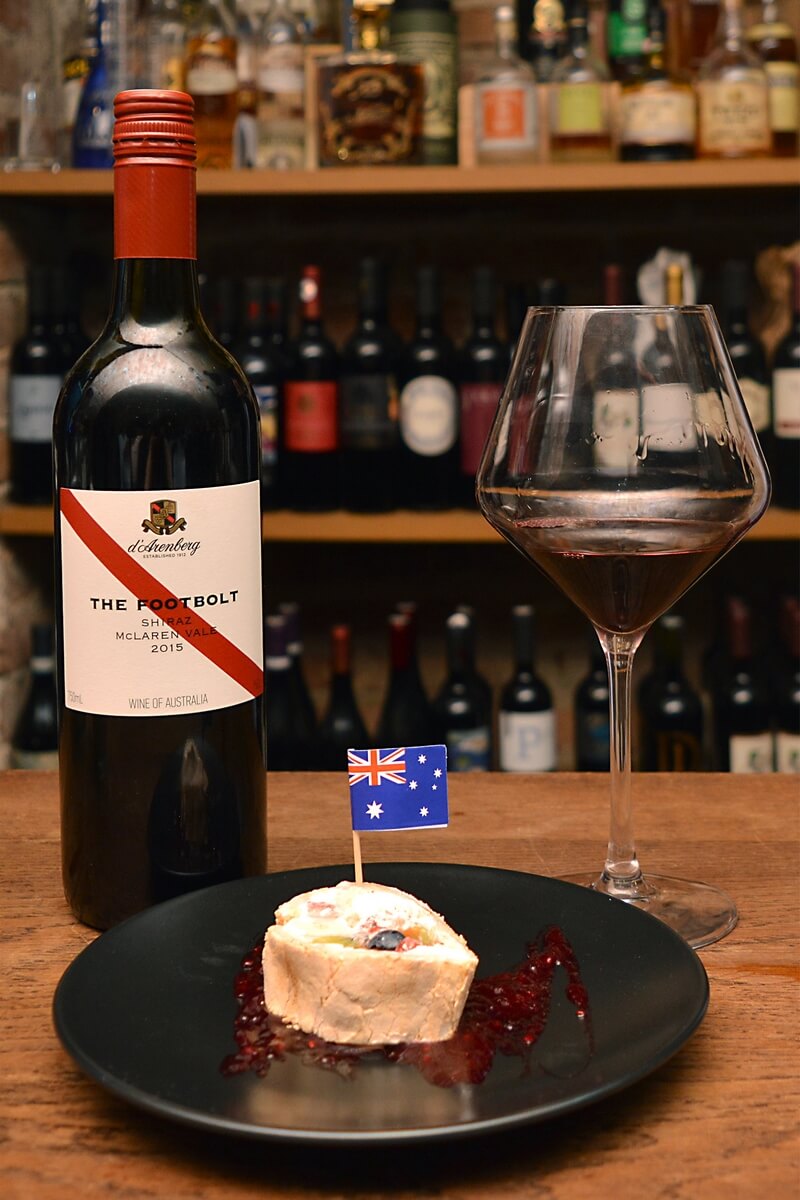
It was a memorable evening and a fascinating and positive mix of different continents, cultures and tastes.
More food and wine news can be found in the Lifestyle section.
Photos by: Silvija Munda
Gin Gourmet Taking Place in Zagreb This Weekend
Immediately after celebrating the International Workers’ Day on 1 May, get ready to taste your favourite liquor – gin! In the heart of Zagreb, at the Avantgarden Event Square, the Gin Gourmet Fair of Croatian gin, brandies and liqueur will be held on 3 and 4 May. The fair venue, the AvantGarden Event Square, is located near the Maksimir park, in Hondlova St. 2/9. For two days, it will become an oasis of top-quality drinks. As the name suggests, AvantGarden is a venue for various events. It has already hosted many private and corporate events, including the unique whiskey fair called “Whiskey Leaks” and the increasingly popular concept of pop-up dinners called Gypsy Tables.
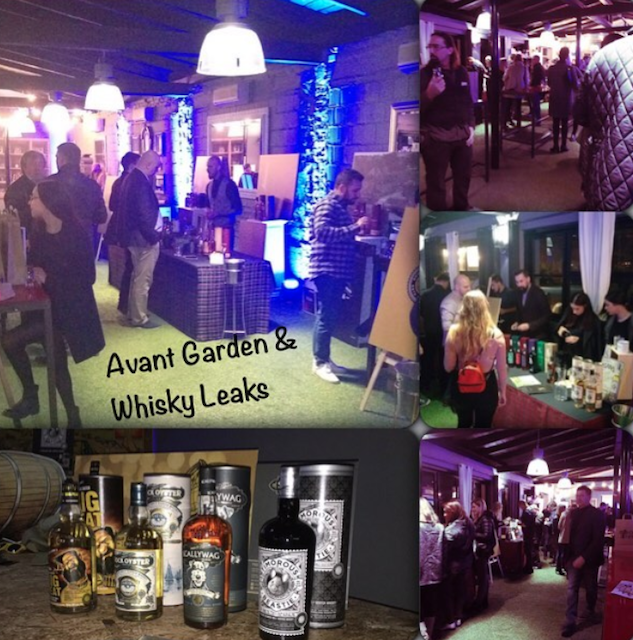
Gin, an absolute classic among alcoholic beverages, has been particularly popular recently among the younger consumers, and also among women. Women are allegedly becoming more and more fond of this well-known "male" drink, which in addition to good taste is known for its use in various cocktails and also for its visual attractiveness. This is probably the reason why women love it.
Gin Gourmet has been conceived as a place to provide local producers with a unique opportunity to network and present the fruits of their work – gins, brandies and liqueurs. Croatian distilleries pay special attention to the production in order to create high-quality, yet homely Croatian products. The speciality of Croatian gins is that they are made with the highest quality natural ingredients and aromatic native plants from the whole of Croatia.
Nearly all local gin distilleries have confirmed the participation at the fair, so fans of this drink will have a unique opportunity to meet: Nostromo Gin by the well-known Istrian distillery Rossi; HVAR22 craft gin from the sunniest island of Hvar; the Rebel Gin by the famous producer Maraska; Rhapsody Dry Gin from Samobor; MAP gin; Karbun gin from the Aura distillery; Old Pilots Gin; MB72 gin; Koraca Gin and many others.
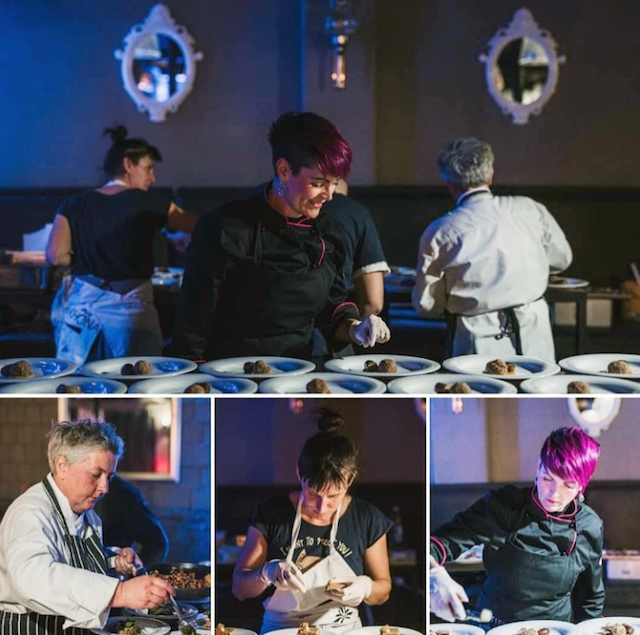
The opening is scheduled for Friday at 5 pm and will last until 10 pm. The fair continues on Saturday, from noon to the evening. Each exhibitor will present its products at a separate stand/desk and will also have the opportunity to hold a 45-minute presentation at the central location where they will present their products individually. Besides the introduction of the exhibitors, the goal of the fair is to educate visitors about the development of Croatian gins, brandies and liqueurs with the aim of preserving the original Croatian product.
Due to the considerable interest of exhibitors and sponsors as well as visitors, the organisers are working on a summer version of the fair to be held in Zadar on 16 and 17 August, at an attractive location of one of the partners. Where precisely that event will be held is still a secret which the organisers will reveal in time.
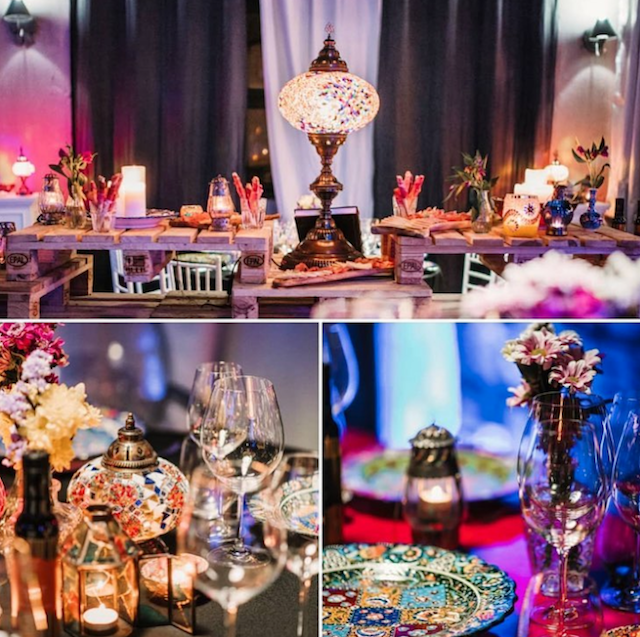
While we wait for the long hot summer, we may start in Zagreb with a glass of our favourite drink – gin!
More lifestyle news can be found in our dedicated section.
Days of Croatian Prosciutto Held in Zagreb
On 26th and 27th of April, Zagreb, the capital of Croatia, is also the capital of prosciutto. Prosciuttos from all over Croatia – from Istria to the island of Krk; from the famous Drniš prosciutto to the various Dalmatian prosciuttos – have gathered peacefully and cheerfully as a part of the fifth edition of the Days of Croatian Prosciutto, which are being held in the capital for the first time.
The event was officially opened yesterday morning at the Hotel International. The opening ceremony was attended by Darko Markotić, president of the Croatian Prosciutto cluster; State Secretary at the Ministry of Agriculture Tugomir Majdak; Dragan Kovačević, Vice President for Agriculture and Tourism of the Croatian Chamber of Commerce; and Zagreb Mayor Milan Bandić. The ceremony also included the presentation of special plaques for the excellence in prosciutto making and the selection of the best Croatian prosciutto for this year.
Ten samples were received for tasting, including all certificated Croatian prosciuttos. That the products offered were of exceptional quality is proven by the fact that all samples won gold medals, and the range of points was from high 87.75 to extra-high 95.38. The Drniš prosciutto Drniških Delicija Maran, with 95.38 points, was the absolute winner.
"I am pleasantly surprised with the title, because the competition was strong, although the number of producers is still too low for us to achieve a breakthrough in Europe," said this year's winner Zoran Ćevid, who produces his prosciuttos according to traditional recipes. For high-quality smoked ham, the most important is raw material. It is also necessary that no more than 72 hours pass from slaughter to salting.
"Statistics show that we produced about 250,000 prosciuttos five years ago, but now the number has reached 400,000. That is a large growth of sixty per cent. This is the result of hard work and large investments, perhaps the largest in the food industry sector, amounting to more than 40 million euro. The biggest success is that the share of domestic raw material in our prosciutto production has grown over the past five years from 10 per cent to more than 50 per cent,” said Darko Markotić, president of the Croatian Prosciutto cluster.
"We will provide national financial support to increase primary production and thus get quality raw material for the production of Croatian prosciuttos," said State Secretary at the Ministry of Agriculture Tugomir Majdak, adding that pig breeding is a strategic branch that the government plans to develop.
“In addition to the export potential, the Croatian prosciutto has a great potential in tourism through the top gastronomic offer, because modern tourists are looking for an authentic experience, and it is through gastronomy that they can best learn about the way of life, customs and rich traditions of a particular destination,” said Dragan Kovačević.
Mayor of Zagreb Milan Bandić presented the gold medals, adding that he also produces prosciuttos which the attendees could taste. Special prizes were awarded for the development of prosciutto production to producers Josip Hreljak, owner of Pisinium, the company famous for the production of top Istrian prosciuttos, and Jure Barić, owner of the Opskrba Trade company from Slivno near Imotski, known for the production of Dalmatian prosciutto.
More Croatian food news can be found in the Lifestyle section.
European Commission Approves Grants for Fruit, Veg and Milk in Schools
ZAGREB, March 28, 2019 - An amount of 250 million euro was approved by the European Commission on Wednesday for the free distribution of fruit, vegetables and milk for 20 million children throughout the EU in the 2019/2020 school year.
The national budget allocations were adopted today. 145 million euro was set aside for fruit and vegetables, and €105 million for milk and other dairy products. The distribution programme is complemented by educational measures that teach children about agriculture and promotes healthy eating, the European Commission said in a press release.
Croatia will receive 1.66 million euro for fruit and vegetables and an additional 800,354 euro for milk.
According to the law that has been applicable since 1 August 2017, 2 previous schemes were combined under a single legal framework which is focused on an enhanced educational dimension.
Countries participating in the programme are expected to prepare strategy outlines for a period of 6 years, noting objectives and priorities, target groups (primary schools, for example), products (apples and carrots for example) and education activities (farm visits, school gardens, training).
"Thanks to the EU School Scheme, our young citizens can benefit from the nutritious, safe and high-quality food that our European farmers produce, while also learning about where it comes from. The Commission is proud to contribute to this important educational journey, establishing healthy habits from a young age," Agriculture and Rural Development Commissioner Phil Hogan said.
More news about EU funds can be found in the Business section.
Gourmet Croatia – How to Brand Croatia as a Gourmet Destination?
The closing conference of the Gourmet Croatia project was held at the Principovac estate near the easternmost Croatian town of Ilok. Neven Ivandić and Neda Telišman Košuta from the Institute of Tourism presented the project and the brochure “Croatia - the New Gastronomic Icon of Europe (Strategy for the Development of Gastronomy, Gourmet and Gastronomic Tourism of Croatia with the Action Plan 2019-2022)”. The overall objectives of the project are to link the food processing sector and the tourism sector through the establishment of local production systems, as well as the territorial branding of Croatia as a recognisable gourmet destination.
After a public tender, the project was entrusted to the WYG Consulting, the Institute of Development and International Relations (IRMO) and the Institute of Tourism (IT), in cooperation with the chef Rudi Štefan. The project brochure explains that the growth of interest in food and beverages reflects profound social changes driven by the improvements in education and prosperity, technology and growing environmental pollution, while the key trends for the development of global gastronomy are experience buying, sustainability, healthy food, multiculturalism, return to tradition, good-quality fast food and growing media influence. That is the framework that supports further development of gastronomy and gastronomic tourism in the direction of creativity, authenticity and sustainability.
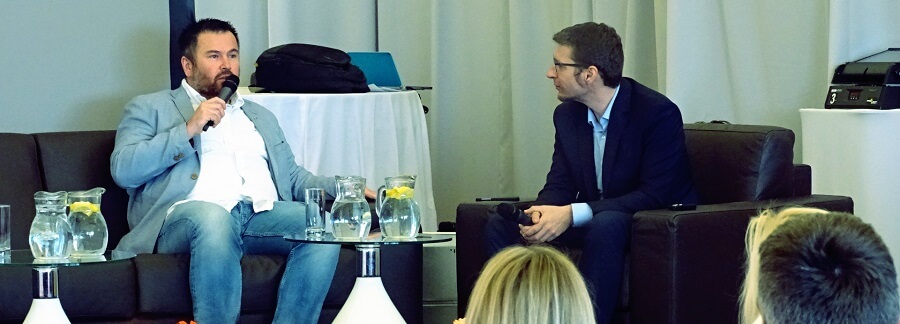
Gourmet refers to the highest-quality segment of gastronomy. Although gourmet restaurants represent less than 0.5% of the total gastronomic offer, they have a disproportionately large influence on gastronomy trends. The characteristics of gourmet cuisine are excellence in ingredients and the preparation and presentation of food, and in particular creativity and specific "trademark" of the chef as a person not only knowledgeable in food preparation but deeply dedicated to the "philosophy" of the cuisine he or she offers. The core of the gastronomic tourism is the eating experience itself that must reflect authentic cuisine, the knowledge of learning about local gastronomy and its protagonists, and ultimately the emotional experience of socialising.
The panel discussion "Value Chains for Gastronomy" was attended by Assistant Agriculture Minister Krunoslav Karalić, Jakša Puljiz from IRMO, Nives Kljajić as a representative of the distributor Portus Croatia, Dimitrije Sinović from the Sin Ravnice company as a representative of the producers, and Tomica Đukić, the chef of the Osijek Hotel restaurant. The discussion was moderated by Ivana Jurić, director of the Osijek-Baranja County Tourist Board.
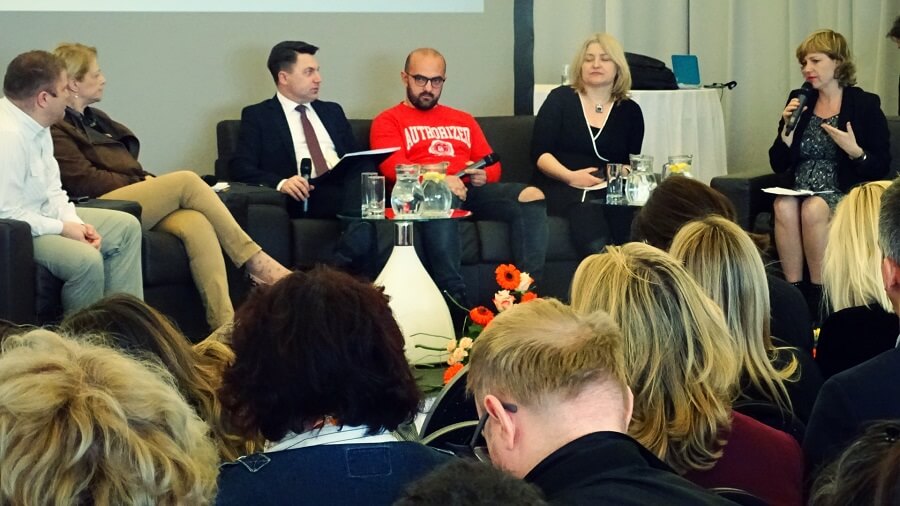
Rudolf Štefan, the chef of the Pelegrini restaurant, spoke about the development of education in the gourmet area. "There are about sixty catering schools in Croatia, huge resources are being spent, but unfortunately not all of these schools produce good staff. We need one high-quality institution that will create the foundations for high-quality gastronomic future of Croatia.”
The second panel discussion "Promotion of Croatian Gastronomy" included Darija Tödling as a representative of the Croatian National Tourist Board, Rujana Bušić Srpak, director of the Vukovar-Srijem County Tourism Board, and Lucija Bilandžić as a representative of the Academy of Gastronomy. It was moderated by Snježana Boranić Živoder from the Institute of Tourism.
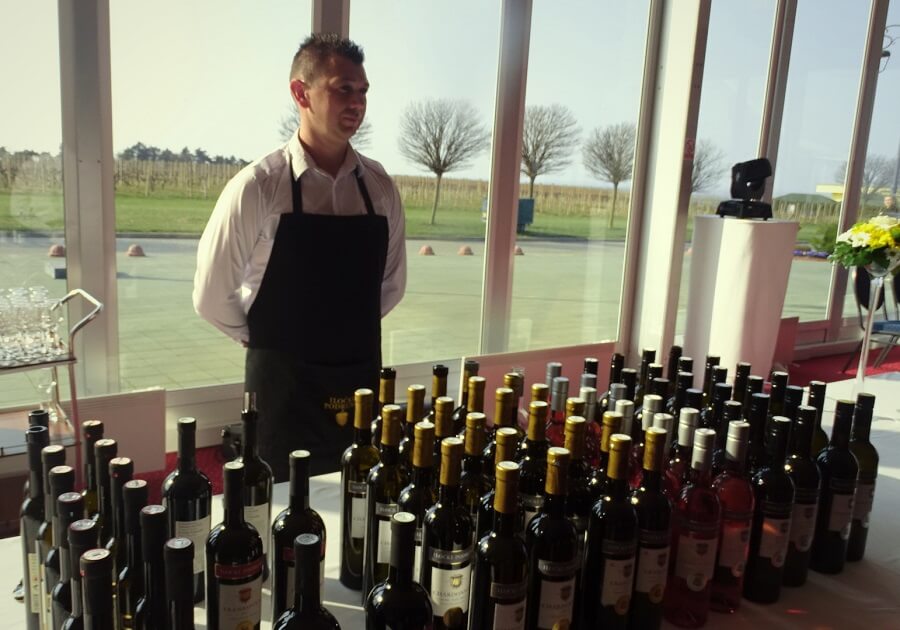
The tourism manager of Iločki Podrumi, Vesna Steiner, discussed the promotion of a destination through wine tourism, and the conference concluded with wine tasting – presentation of the Iločki Podrumi wines.
More news about Croatian gastronomy can be found in the Lifestyle section.
R'n'B Weekend Zagreb Project Announced
The organisers of the renowned Rovinj Weekend Media Festival, Tomo Ricov and Boris Kovaček, announced on Thursday at the Zagreb cafe "In the Backyard" their new project R'n'B Weekend. R'n'B Weekend Zagreb is a combination of a conference, a fair and a festival aimed primarily at encouraging excellence in the hospitality and food and beverage industries. The four-day event held at the HAZU Glyptotheque in Zagreb will bring together some of the world's experts in the field. The Glyptotheque of the Croatian Academy of Arts and Sciences (HAZU) will host the R'n'B Weekend Zagreb (Restaurants & Bars Weekend) from 23 to 26 May.
Boris Kovaček said that the gastronomy industry is undoubtedly one of the most important parts of the tourism business and announced exciting panels that will cover, among other issues, the modern Croatian cuisine and the gastronomy development strategy. The festival will be divided into three topical categories – food, drinks and coffee.
Matija Belković and Matija Hrkać from the Cogito Coffee company announced masterclass workshops and lectures related to the industry and culture. "Since coffee has a special impact on the Croatian culture, it will also have a separate part of the programme – Zagreb Coffee Weekend, which will be based around lectures by leading world experts in the coffee industry, workshops and tastings of various types of coffee," explained Belković.
The press conferences and the barbecue "In the Backyard" brought together a number of well-known representatives from Croatian gastronomic scene, including Hrvoje Kroflin from Mano2, Jurica Jantolek and Borna Janeš from Pod Zidom, Matija Jagić from Brokenships Bistro, and Ivan Zidar from Mason Burgers & Stuff. Everybody enjoyed the barbecue, with meat provided by the Meat the King and prepared by chefs from the Lobby restaurant.
Additional insight into the festival programme was given by one of the most famous Croatian chefs, Mate Janković, one of the Weekend participants. "The festival is a kind of celebration of the synergy of people who run it and are strong in their niches – events, music, coffee, cocktails, food, drinks... The programme will enable professionals and everyone else to expand their gastronomic horizons. The festival will offer something for everyone. One of the topics will be the tuna and how to treat it, while other programme details will be revealed soon at several promotional events that will precede the festival itself," said Janković.
Perhaps the most exciting part of the festival includes food, and it was presented by the famous Croatian gastro-journalist and consultant Hrvoje Petrić. "This year the emphasis will be on salt, so we will have an interesting panel about Croatian saltworks and a masterclass on the application of salt in modern cuisine, which will further confirm Croatia as a salt country. Also, we are delighted to have the biggest stars of sourdough bread production in the region, and we have the best of the best of the Croatian pastry scene," said Petrić.
The relaxed atmosphere "In the Courtyard" was created by the music played by DJ Tomo Ricov, while Marin Nekić performed a live cocktail show and announced the barista part of the festival. "The panels and workshops will cover the bar industry, which includes hotels, restaurants and bars in Croatia, with the aim of raising the quality of the touristic offer and the awareness among professionals and customers. We are preparing interesting topics, and one of them, which I believe will be especially interesting to the audience, is what is the new gin," Nekić announced.
More news about festivals in Croatia can be found in the Lifestyle section.
How to Connect Tourism and Local Food Producers
On Thursday, a discussion was held at the Museum of Taste in Osijek on tourism and local food products, with an emphasis on the Istrian experiences. Slavonians welcomed their Istrian partners involved in the agriculture and tourism sectors through the organisation of events, protection and promotion of original products and dishes, and the creation of tourism products related to enogastronomy.
The discussion was attended by Ezio Pinzan, Ph.D., head of Agriculture Department of the Istrian County, Sanja Kantaruti, director of Central Istrian Tourist Board, and Mario Bratulić, Ph.D., Mayor of the Municipality of Sv. Petar u Šumi and founder of the "With Sausage to the EU" fair. The panel was moderated by Davor Šišović, a journalist with Glas Istre, a publicist and a promoter of enogastronomic events who emphasized in his introductory remarks that “tonight we are discussing food, not for subsistence, but food as one of the basic tourism identifiers, we are talking about gastronomy as an art, as a tradition. We are also talking about the policy that must ensure that all these things are not forgotten and have an active, creative and productive function.”
In addition to the experiences of Istria, the participants also discussed creating links between family farms and catering and hospitality facilities in the area of Osijek-Baranja County and further plans for linking the agriculture and tourism sectors. Since food and hospitality is one of the first associations about Slavonia, the Istrian experiences are precious in the process of creating and establishing Slavonia and Baranja as an enogastronomic destination. Along with the representatives of Istria, the panellists included Osijek-Baranja County Prefect Ivan Anušić, the chef of the Croatian Football Federation and Osijek Hotel Tomica Đukić, the head of county Agriculture Department Silva Wendling, and Director of Osijek-Baranja County Tourist Board Ivana Jurić.
The topics were the role of local and typical products in forming a tourist experience, the importance of supporting the local production sector, enogastronomy as an essential tourist product of Croatia and the expertise of Istria, the philosophy of zero kilometres "in the kitchen", the recognizability of a destination created through tastes and smells, the importance of educating catering staff on local wine ranges and typical dishes, the protection of products such as the Istrian boškarin or black Slavonian pig, and other related topics.
Ezio Pinzan emphasised that almost twenty years ago there were just a few boškarins in the whole of Istria, who had the status of pets, and that today there is no serious family farm which does not offer meat of the Istrian cattle. The Istrian County efforts also helped turn the focus on the boškarin. He also noted that substantial progress has been made in the field of winemaking through the establishment of the Vinistra association and the eponymous event and that the county has invested heavily in the reconstruction of abandoned olive groves. “For the fourth year in a row, we are the best olive growing region in the world. Just yesterday we received a protected designation of authenticity for our extra virgin olive oil” said Pinzan and continued, “Truffles are something we are yet to exploit in our gastronomy. Istrian prosciutto is the first product that we protected with a designation of origin, and it took us fifteen years,” which shows that success will not come overnight.
Mario Bratulić, who has a doctorate on the topic of Istrian sausages and autochthonous products, pointed out that Sv. Petar u Šumi is the demographically youngest Istrian municipality, a small, but active and propulsive community, and that they wanted to create a gourmet event that would go beyond the local community. They came with this idea to the county. “As part of the fair, we enabled producers from Slavonia to come with their products. Last year, one Slavonian producer sold a full van of charcuterie products! We have established cooperation with fifteen sausage events and associations from Central Europe.”
The head of Agriculture Department of Osijek-Baranja County Silva Wendling emphasised that since 2015 the county has been co-financing service providers in catering and tourism sector who buy food from local producers and added that "when tourists come to a certain area, they want to experience this region, among other things, through taste.”
Director of Osijek-Baranja County Tourist Board Ivana Jurić stressed that Slavonia combines agrotourism, wine tourism and active tourism, and added that "we are only starting to realise that we are a tourist destination, but the demand for Slavonia is on the rise.”
More Slavonia news can be found in the Lifestyle section.

